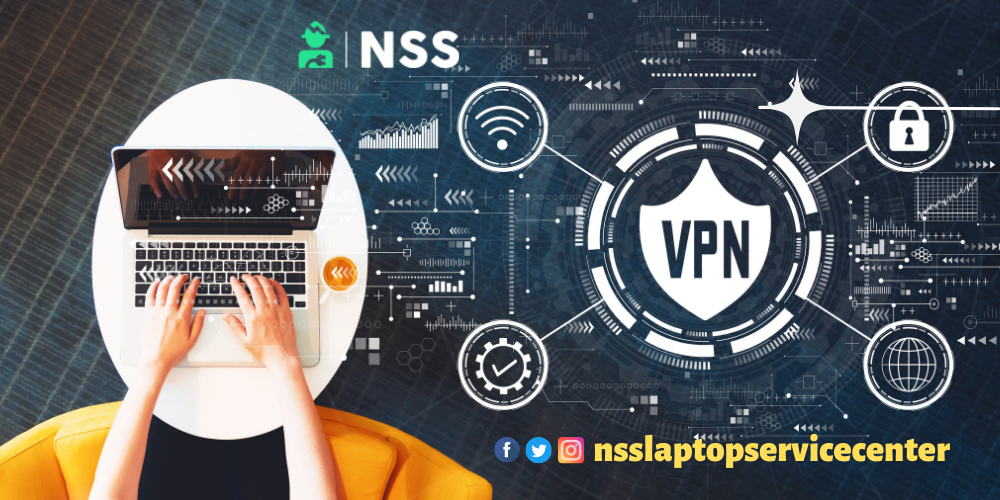
Connect VPN In Laptop - Simple & Easy Steps
Your internet activity is protected from prying eyes on the network when you use a VPN since it is routed through an encrypted server. In other words, neither your ISP nor other users of the same Wi-Fi network can see what you're doing online. Networks like your work or school network, which are typically unreachable when connected through your usual ISP, can also be accessed using VPNs. You may choose from a range of commercial and free VPN providers if you're not using one for work or school, and most of them can be used on your computer, phone, or tablet. Learn how to set up a VPN at this NSS Laptop Service Center.
Table of Contents
Use VPN On A Laptop
You can use your Windows PC to connect to a virtual private network (VPN), whether it's for business or personal use. When working from a coffee shop or other public location, a VPN connection can provide a more secure link and access to your company's network and the internet.
Note: Windows 11 SE does not provide this functionality. Study more
Establish A VPN Profile.
A VPN profile needs to be installed on your computer before you can connect to a VPN. Either set up a work account to obtain a VPN profile from your organization or build a VPN profile on your own.
Before you start:
When you're at work, check your firm's intranet site for VPN settings or an app, or contact the support person.
If the VPN service is one you subscribe to for personal use, check if there is a Microsoft Store app before visiting the VPN service's website to see if the recommended VPN connection settings are available.
After clicking Start, input settings. To add a VPN, select Settings > Network & Internet > VPN.
Network & Internet > VPN." width="558" height="195" />
Make the following changes in Add a VPN connection:
Select Windows as your VPN provider (built-in).
Enter a familiar name in the "Connection name" field (My VPN). You'll search for this name while connecting to a VPN.
Enter the VPN server's address in the Server name or address box.
Select the kind of VPN connection you wish to establish under the VPN type. You must know the VPN connection your provider or VPN service employs.
Select the Type of sign-in information (or credentials) under the Type of sign-in info. If you're connected to a VPN for work, this could be a username and password, one-time password, certificate, or smart card. Put your username and password in the corresponding fields (if required).
Choose Save.
Choose the VPN connection and then click Advanced options if you need to update the VPN connection information or specify extra parameters, such as proxy settings.
Link up with a VPN or Connect the VPN To a Laptop
You can connect after you have a VPN profile.
Select Network & Internet > VPN under Settings.
Select Connect next to the VPN connection you want to use.
Enter your login, password, or other sign-in information if asked.
The VPN connection name will say Connected underneath it after it is established. Hover your mouse pointer over the Network icon in the taskbar's far right corner to see if the VPN connection appears active when using your PC to perform tasks.
Tip: The notification area and quick settings allow you to connect to a VPN. On the taskbar, click the Network icon, then click Edit quick settings > Add > VPN > Done to add VPN as a fast setting.
with a VPN
1. Launch your VPN application. It's time to launch your VPN after downloading and setting it up. The software can be found in your Windows menu if you're using a Windows computer. It will be in your Applications folder if you're using a Mac. Users of smartphones and tablets can discover the VPN service icons in their app lists.
2. Log on using your account. Most VPN services need you to generate a username and password when you sign up. The initial time you log in is typically the only time you need to enter this information, though more secure sites can require a fresh login each time.
You will have secure access to your network if you use a company's VPN or most personal software. A virtual desktop, sometimes known as a new window that resembles your desktop at work and from which you can access company resources, might appear. Alternatively, you might need to open your web browser and input a secure web address to access your firm's help.
Only activate your VPN service when you need to secure your IP address if it has usage restrictions on how much data or time you can use it.
3. Read the usage guidelines. Ensure you read the usage conditions before using a VPN for personal use. Some VPNs, especially the free ones, could set up extra software or show advertisements. Please ensure you know your VPN's services, the obligations it places on you, and the data it gathers.
Also Read: How To Record Screen In Laptops
Also Read: Why You Should Service Your Laptop Regularly
Conclusion :
I won't say much, as the blog has informed you how to connect a VPN to a laptop. It is an easy process, and you can use it for various purposes.
Frequently Asked Questions
Popular Services
- MacBook Battery Replacement Cost
- HP Printer Repair in Delhi NCR
- Dell Laptop Repair
- HP Laptop Repair
- Samsung Laptop Repair
- Lenovo Laptop Repair
- MacBook Repair
- Acer Laptop Repair
- Sony Vaio Laptop Repair
- Microsoft Surface Repair
- Asus Laptop Repair
- MSI Laptop Repair
- Fujitsu Laptop Repair
- Toshiba Laptop Repair
- HP Printer Repair Pune
- Microsoft Surface Battery Replacement
- Microsoft Surface Screen Replacement




